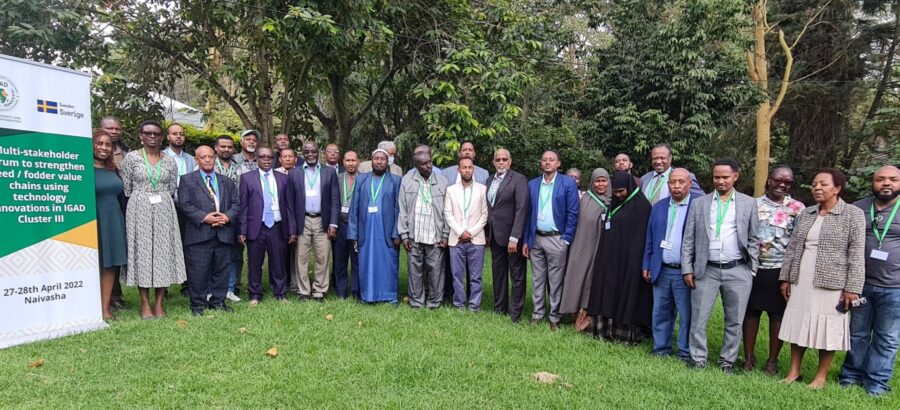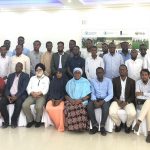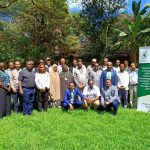Increased frequency of droughts, floods and other climate-related disasters have eroded the livelihoods of communities in IGAD cluster III (Mandera ecosystem of Ethiopia, Kenya and Somalia). Communities are subject to chronic food insecurity, protracted competition and conflicts over natural resources such as pasture and water for their livestock, occasionally leading to unwarranted loss of human life. IDDRSI PCU in collaboration with ICPALD, planned a follow up meeting to the September, 2021 multi stakeholder platform meeting to review status of utilization of innovations and technologies along the feed and fodder value chains. Dr. Harry Oyas, on behalf of CVO, Kenya, MoALFC, State Department of Veterinary Services, republic of Kenya, opened the two-day physical meeting running from April 27-28, 2022. He noted that climate change is affecting IGAD region with 3 year long dry spell currently being experienced posing a big challenge for livestock value chain. Only concerted collective action can mobilize and address the challenges for the region. Dr. Adan Bika, ICPALD and Dr. Tesfaye Beshah, IGAD Secretariat, made welcome remarks. The meeting was attended by 41 participants from representative farmer/pastoralist groups, technical experts from Kenya, Ethiopia and Somalia, GEWDO, KEMLEIC, Bahati slaughterhouse chair. IGAD secretariat and ICPALD. The meeting made the following recommendations:
- Fodder forum members are encouraged to share progress reports that are data based to demonstrate realized benefits from the interventions or investments in fodder/feed production sector.
- The forum should strengthen efforts on good agriculture/feed manufacturing practices (GAP/GMP), quality control of feed safety and seed quality, by liaising with national standard setting and certification agencies.
- Stimulate growth of commercial feed/fodder production by supporting producers and traders groups (e.g cooperatives and youth groups) and link them to market outlets (National Govt, NGO and, Sub-national governments, private sector etc.), as well as promote PPP approach for investment.
- Promote utilization of early warning tools (PLEWS, predictive forage tool, PET, feed inventory etc.) to inform surplus and deficit areas to drive supply and demand.
- Promote rangeland rehabilitation (reseeding, control of invasive species, soil erosion etc.) guided by the IGAD rangeland strategy.
- Promote diversified sources of livestock nutrition by utilizing invasive species (prosopis, acacia, water hyacinth etc.).
- Identify and document existing good practices for replication in fodder seed production, multiplication, harvesting, storage and marketing.
- Strengthen resource mobilization to promote investments in technologies that can boost commercial fodder production such as irrigation, hydroponics, aeroponic etc.
- Encourage MS to have a feed security strategy and action plan with embedded communication mechanism.
- Promote advocacy and community awareness creation for an enabling environment, for enhanced investment on water development and commercial fodder production and use.
IGAD expresses appreciation to government of Sweden for funding this activity.






